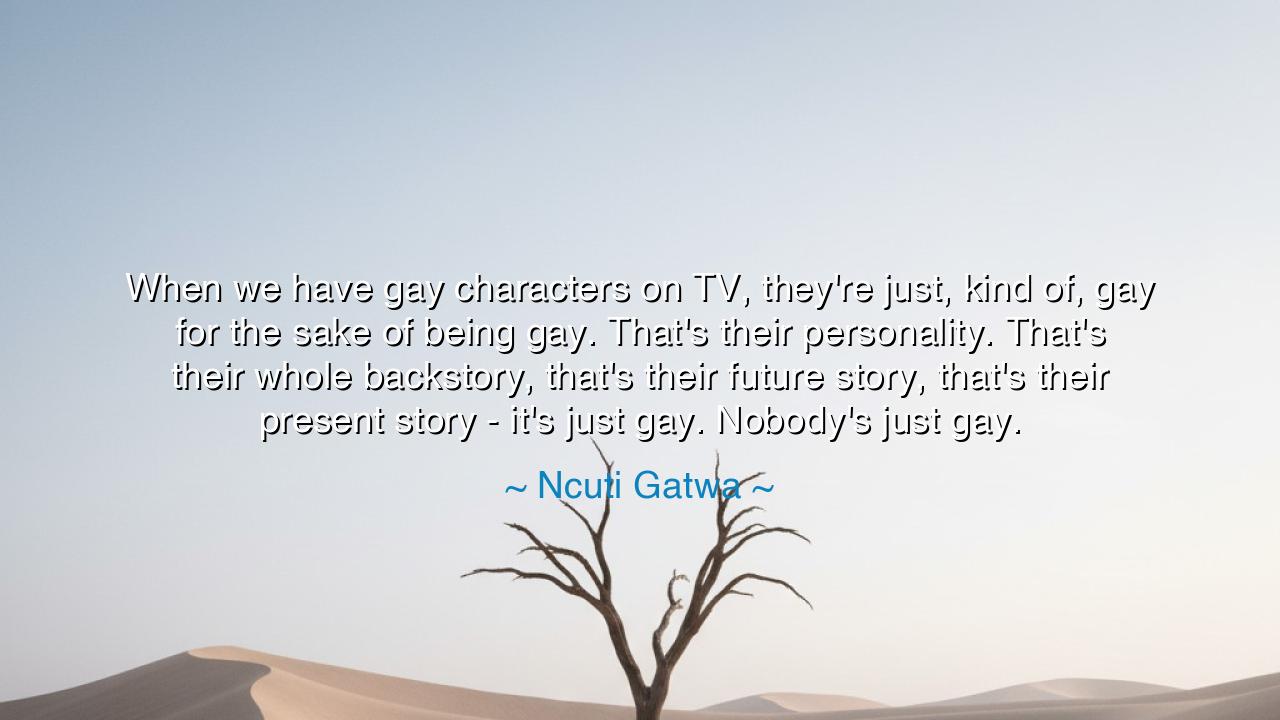
When we have gay characters on TV, they're just, kind of, gay for
When we have gay characters on TV, they're just, kind of, gay for the sake of being gay. That's their personality. That's their whole backstory, that's their future story, that's their present story - it's just gay. Nobody's just gay.






In the rich and ever-evolving tapestry of human experience, the deepest truths lie not in simplifying people to a single trait or identity, but in embracing their complexity and fullness. Ncuti Gatwa captures this when he says, "When we have gay characters on TV, they're just, kind of, gay for the sake of being gay. That’s their personality. That’s their whole backstory, that’s their future story, that’s their present story - it’s just gay. Nobody’s just gay." These words speak to the misrepresentation of identity in media and the importance of portraying people in their full humanity—with all the nuances, contradictions, and richness that comes with being fully alive. To reduce someone to a single aspect of who they are is to flatten the complexities of their existence, erasing the depth of their story.
In the ancient world, the Greeks celebrated the complexity of the human spirit. In Homer’s Iliad, the heroes were not defined by their single characteristics, but by their honor, strength, wisdom, and even their flaws. Achilles, the great Greek hero, was driven by pride, but also by a deep sense of loyalty and love. Hector, his Trojan counterpart, was defined by his duty to his family and city, and yet he showed moments of vulnerability. These figures were not reduced to one single aspect of their being; they were multidimensional, grappling with love, loss, fear, and honor. Just as Gatwa points out, to reduce a character to being "just gay" is to rob them of their full narrative, their depth, and their humanity.
In ancient Rome, Cicero spoke of the ideal of human virtue—that true greatness lies not in being defined by a single role or characteristic, but in the way one lives a full and virtuous life, showing wisdom, strength, and integrity across various aspects of existence. The Roman ideal of the virtuous man was one who exhibited a balance of wisdom, courage, and compassion. To reduce any individual to a singular trait would have been considered a disservice to their potential and character. Gatwa’s words resonate with this ancient understanding: people, like characters in a story, must be shown with depth, balance, and a recognition of their many facets, not reduced to one isolated aspect of their identity.
In more modern history, the great playwrights like Shakespeare portrayed characters with immense complexity. Consider the character of Hamlet: though he is often remembered for his indecisiveness and melancholy, he is also a son, a prince, a philosopher, and a deeply conflicted man. Shakespeare’s genius was in his portrayal of human complexity—characters were never defined by a single trait. Much like Gatwa’s critique of TV portrayals of gay characters, Shakespeare sought to show that no individual, no matter their background, is ever defined by just one thing. Each person carries within them an intricate blend of traits, emotions, and stories that make them who they are.
The current tendency to simplify gay characters into a singular identity is also a reflection of a larger cultural trend: the rush to fit people into categories, into easily digestible labels. This, however, risks ignoring the multidimensionality of the human experience. Gatwa’s insight is a call to action for media creators, encouraging them to move beyond clichés and represent individuals in all their complexity. Just as Plato’s dialogues often focused on understanding the nature of the soul in all its facets, so too should our understanding of identity transcend simple labels. To be truly human is to be more than the sum of our parts.
The ancient Chinese philosopher Confucius emphasized the importance of understanding the full nature of a person in all their roles: as a son, a leader, a teacher, and a friend. His teachings centered on the idea that one should strive to understand and act in alignment with the fullness of one’s identity and responsibilities, not just a single, isolated role. This philosophy mirrors Gatwa’s argument that we cannot reduce someone to just one characteristic, whether that be their sexuality, their gender, or their occupation. Each individual, like each character in a story, is a tapestry of experiences and qualities that together define who they are.
The lesson from Gatwa’s words is a profound one: identity is not something that can be defined by a single trait. Just as the ancients taught that the human experience is multifaceted and complex, we must apply this wisdom in our own lives and our portrayal of others. Whether in the stories we tell, the people we interact with, or the way we view ourselves, we must resist the temptation to reduce individuals to one single aspect of their identity. Instead, we must seek to embrace the full complexity, depth, and richness that each person brings to the world. In doing so, we will ensure that we not only respect others as whole beings but also honor the fullness of our own potential.
In practical terms, this means we must strive for inclusivity and representation in all forms of storytelling, ensuring that every individual, regardless of their background or identity, is portrayed with the same nuance, dignity, and complexity that define their true humanity. This is the path toward a world that celebrates the full spectrum of human experiences, embracing each person not for a single label, but for the entirety of their being. Let us, like the great ancients, remember that true wisdom lies in seeing people as they truly are: multidimensional, dynamic, and whole.






AAdministratorAdministrator
Welcome, honored guests. Please leave a comment, we will respond soon